“I don’t look for trouble, but I welcome it when it comes.” – Ted Box
A seventy-foot scow schooner named Seeker – the enormous dream, the passion, the love child of master boatbuilder Ted Box – lies yet unfinished and moored in Lake Tashmoo’s far end, eyed mainly by cormorants, ospreys, and passing boaters. Four years after launching, the boat looks pummeled. The black painted hull that came to life on Beach Road, Vineyard Haven, now looks worn and tired. The old-growth white pine deck plugged with at least 4,000 bungs and caulked with half a mile of pitch, then sanded and varnished, has seasoned. Seeker has no masts, no rigging or sails, no engine. Yet the ship’s wheel juts up proudly, ready for her captain.
For three years, with a changing crew of volunteer help, Box built Seeker on a then-vacant lot leased from Edgartown entrepreneur and philanthropist Ernie Boch Jr. In the summer of 2011, he and his son Jake constructed a shelter of corrugated steel, and under it Seeker’s giant hull took shape, looking like splayed whale ribs. He embraced woodworkers, friends, students, his sons, and strangers, grateful for all, long-term or drop in, experienced or novice. He wanted help from kids he saw as at risk, eager for them to have a life-changing experience. Box encouraged a true community project, determined to make a contribution to the Island. Volunteers framed and planked, tarred, sanded, drilled, glued, painted, and polished. Press, photographers, and filmmakers arrived to document, and tourists flocked to ogle. Local businesses discounted supplies, and when Seeker had to move before completion, Ralph Packer, longtime mariner and owner of Tisbury Wharf Company and Packer Fuel, donated a new beachfront construction site, where work continued for four more years. Relocating the twenty-two-ton boat was like moving a house, requiring insurance, state permits, and police supervision for road closure.
A huge idea: a Vineyard tall ship, a flat-bottomed working vessel that would teach young people boat building and maritime skills. With her twenty-five-foot beam she might serve as a freight boat or become a floating gallery, or a maritime experimental theater, or a classroom on water. Box self-financed Seeker, but also obtained nonprofit status and set up an Indiegogo crowdfunding campaign. During the summer months, the donation box at the site would often be full by day’s end. Still the project had to slow now and then when Box ran out of money and paused boat building to ply his trade as a master carpenter, renovating and constructing houses. He found time to make innovative, artistic driftwood furniture, as well as teach ballroom dancing, practice martial arts, write poetry and essays, and lead an early-morning Tai Chi group.
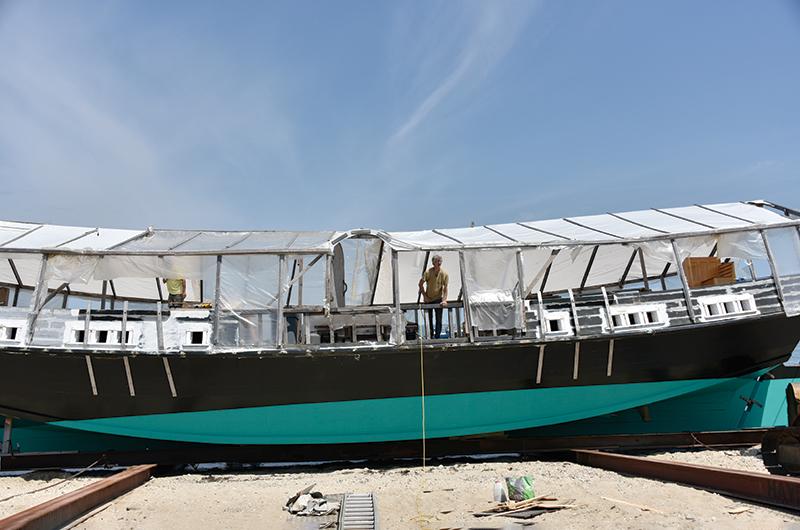
And then in 2015 an aggressive cancer of the tongue and neck forced him to stop. He tried alternative treatment before yielding to radiation that brought terrible pain; his weight dropped to 116 pounds and he could barely walk, much less work on the boat. It took all his determination to recover, but nine months after treatment he resumed work on Seeker, cancer-free.
All this happened before we met. In October 2015, I learned that two trees felled in Vineyard Haven had been set aside for Seeker’s masts. I went to check out the enormous, ivy-covered pine trunks stored by the harbor. And then I walked down Beach Road where a great ark of a boat, Seeker, loomed from her construction cradle, looking both ancient and hopeful. When I heard the whir of tools above me, I climbed the tall ladder to the deck.
As I swung my leg over the railing, Box glanced up, turned off his sander, and set it down. His hands were powerful; veins roped his arms. He seemed unconcerned that his glasses were flecked with sawdust. A trove of well-used carpenter’s tools surrounded him – saws and drills and levels and planes plus dozens of rusted pipe clamps. He welcomed me with a spirit of inclusivity, as he has welcomed so many.
And like so many others, I returned over and over. The way he described the demanding work and grueling hours would have most people grimacing, but he smiled as he talked. His generous acknowledgment of master craftsmen and boatbuilders and all who had helped him impressed me. I marveled at his continual optimism for this daunting project. Over the years we talked, I charted the progress and setbacks of Seeker, but because I am neither a builder nor a mariner, I focused on unraveling the personal history and life force that shaped the character of this indomitable, highly focused man.
Box describes a magical early childhood, growing up in Seaford, Long Island, which the original Native American inhabitants, the Marsapeaques, called Great Water Land. Fish, shellfish, and game were plentiful, and the Native Americans exported wampum made from shells. After the first English colonist arrived in 1643, the area became known for harvesting salt hay and its abundance of seafood. The Box family had deep roots in the community, a small town where most streets dead-end onto marshlands or creeks, or the river, or one of the eighteenth-century canals that flow into the South Oyster Bay. Even as a young boy Box knew everyone in his neighborhood and beyond; the bay, the harbor, the marsh islands, the boats were his playground, and in this paradise he first found the freedom and discipline that define him.
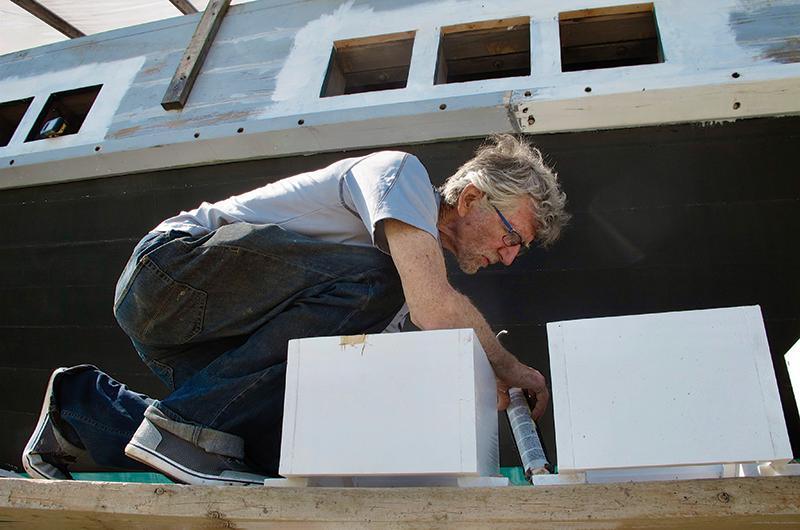
There’s a strong maritime tradition in the family beginning with his maternal great-grandfather, Thomas Morrell, who left home for the sea when he was twelve, in 1865. His son, Box’s grandfather H. Thomas Morrell, became a minister, a scholar fluent in seven languages, an athlete “second only to his friend Jim Thorpe,” Box says, “a powerhouse who at age sixty-five built a boathouse by himself.”
On the Box side of the family, life lessons came from his father, Theodore – “a great bayman,” Box calls him, a dashing, handsome, tough man who “brought home his paycheck” as a logger, a road dynamiter, then an employee of Republic Aviation for thirty-seven years. As a child during the Great Depression, Theodore had been responsible for gathering food to feed his five siblings as well as extended family. “Catching fish wasn’t sport for him,” Box says. Necessity was a lesson he never forgot.
Box built his first boat at age fourteen with plans from Popular Mechanics. But the plan had a square front like a punt, and he was halfway through building it when he decided to change it. He wanted a bow “like every other boat,” but didn’t know how to convert it. After three weeks his father called him into the garage. They both looked at the boat. His father said, “You’ve got a month to finish that boat or I’m going to take an axe to it.” Box understood that his father had made sacrifices to pay the small cost, maybe $30, “but that was still five pairs of shoes for the family.” He took a week to figure it out, and before the deadline had the boat finished. “My father got two of his friends to help launch it; that was his way of showing I’d done a good job. He didn’t go out of his way to give me a lot of information; he showed me things. He expected things. And I wanted to be a hero in my mother’s eyes, but a man in my father’s eyes.”
Although Box calls her a difficult, contentious woman who “alienated everyone she ever met,” Gertrude Morrell Box, his mother, was not only beautiful but as athletic as her father had been. She had been a synchronized swimmer in Guy Lombardo’s aqua shows at Jones Beach Marine Theater, a champion ballroom dancer, a lifetime church organist; she rode a Harley in her seventies, flew her own plane, earned three doctorates, taught English at Rikers Island prison, and engaged civil rights attorney William Kunstler to take on the New York school system when they refused to let her teach driver’s ed.
She married looking forward to the great adventure her husband promised – perhaps a sheep farm in Australia or aviation in Alaska – but gradually she understood that this had been dangled in the heat of courtship and would never happen. Babies came, eight in all: Trudy, Terry, Ted, Tess, Tom, Tim, Tiara, and Todd. She grew embittered. She was determined to prepare her eldest son, training him from infancy to fulfill her thwarted dreams. She encouraged him to climb trees and, by age three, she had him swimming across the canal and back. She provided a trapeze and rings; he learned to do flips. He could jump over boats, dive into the canal and come out on the other side, cut a hole in the ice to swim in winter. “I had to stay in shape, do what she could do,” he says. “I liked it. I wanted to extend my range. I never said it out loud, but I thought of myself as the King of the Harbor. I was the fastest swimmer, fastest skater, not fastest runner – my sister could outrun anyone so I didn’t mind – but I could do the ocean.”
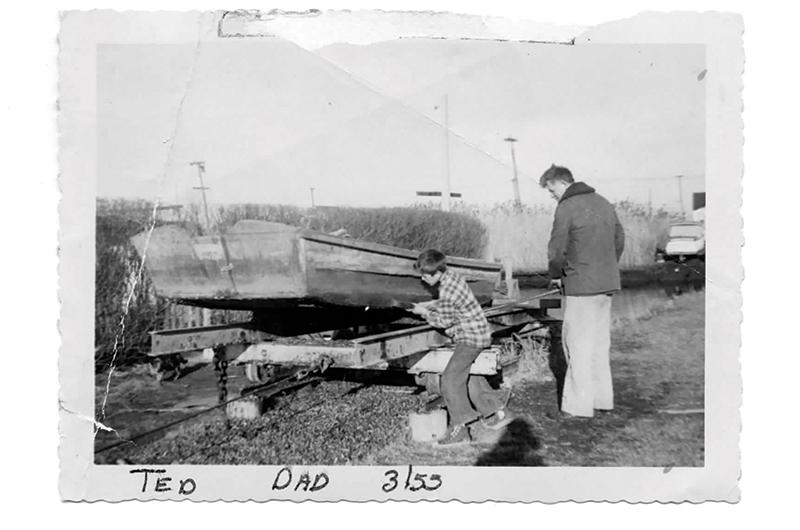
His mother wanted him to be as stoic as the explorer Ernest Shackleton, insisting he not show pain, even getting stitches without Novocain. He responded to it all. They were co-conspirators: “The tinder and the match coming together,” he says. When he was eight, his magical childhood ended. His mother had a nervous breakdown that dramatically changed the tenor, if not the configuration, of the family. His father stayed. But in the eyes of Box and his siblings, his mother became frightening. “So I just didn’t spend much time in the house. I was outside winter and summer, honing my skills.”
While Gertrude insisted on her son’s physical prowess, her demands did not extend to school. “I should have graduated high in my class,” Box says, “but graduated next to last. I was creative and insisted on being creative in my academic world. I always had a will.” As a baby he was not going to stay in the crib, so he climbed out. His father inverted the playpen to keep him in, then had to saw him out when Box’s head got stuck between the slats. He insisted on getting a boat while his arms were still too short to row, so he sat in the bow and paddled. This was the spirit he wanted to keep through school. “They wanted to break something in me that I wouldn’t let them touch,” he says of his refusal to give into academics. “It cost me, but I more or less stayed intact.” He remained unmotivated until his final year of high school when a teacher recognized and channeled his potential.
At the University of Miami and the University of Hawaii, he majored in music because he played piano, trombone, ukulele, and violin – instruments he had learned at the insistence of his polymath mother – before switching his major to marine science.
He had been ten when he first became aware of major development in his hometown of Seaford and neighboring Wantagh, growth that added more than 500 houses to the area. The Cedar Creek sewage plant was not operational until 1973, nonetheless developers continued to build and sell houses over two lucrative decades. “They just left the gate open and the sewage went into my world and destroyed it.” If the new density of the town upset him, it was the ruin of the natural world that broke his heart. He describes creeks through the marshes that had been so full of life “you couldn’t fit another fish in if you wanted.” Pollution became so severe that fish no longer spawned in their traditional grounds. Eels disappeared, as did crabs, and the minnow-like killies that overwhelmed a slice of bread in the killie pot. Oysters became inedible. “It’s never come completely back,” he says.
It was this understanding of the fragility of nature, and feeling he’d had enough of academic life, that made him leave school. “I loved the bay, the water, fishing – so when I quit college after two years, having done pretty well, I felt done.” A friend from Provincetown wrote to him in Hawaii to say he had a boat that they could fix up and charter and sail around the world. Box was in.
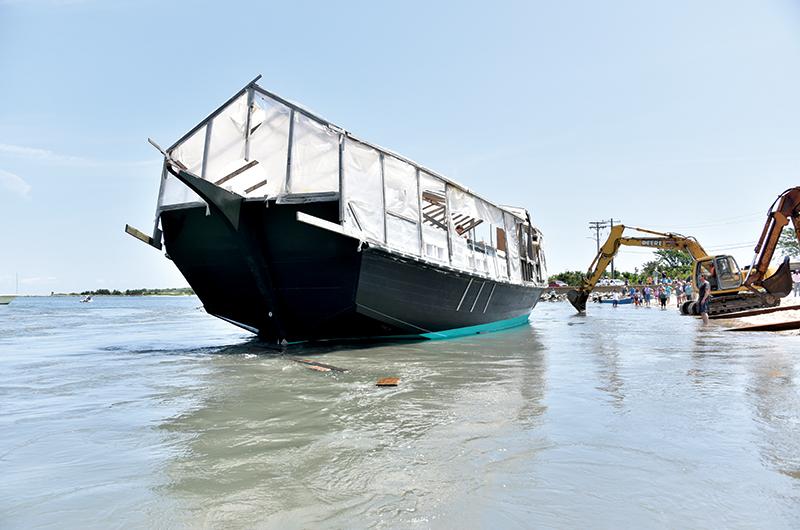
In Provincetown he met his mentor, Francis “Flyer” Santos, “a man of integrity and competence” who took him on as an apprentice. It wasn’t easy. “Most guys couldn’t last a day,” he says. “They’d quit at lunchtime and not come back for a paycheck.” At first, his only jobs were moving boats, scraping bottoms, and shoveling sand. “Then one day I got to paint the bottom of a fishing dragger. It’s a miserable job. Was then and is now. But it wasn’t that way to me. It was a doorway into a life I wanted.”
Box became a boatbuilder, thriving in the life he found, with Provincetown providing a version of his hometown. He did rescue work, saving vessels from sinking on the sea or at the wharf. He dove into water in his underwear in winter. He bailed out boats in 100-miles-per-hour winter hurricane winds, and as a builder and rescuer became an adopted son of the fleet of seventy boats. Occasionally he would take a job at sea – trapping lobster, long lining, dragging – but he was mainly interested in learning to build boats.
His next step was to build a replica of a Block Island Double Ender boat to sail around the world. He began work in February, set sail in October, but aborted during a severe storm in the Bahamas because he didn’t want to jeopardize the life of his girlfriend, Christine Berlingeri. “After spending a year together in a twenty-two-foot boat and finding we were still in love, we tied the knot,” Box says. Returning to Provincetown he started his own shop, building some small boats but never achieving what he wanted. But on land, he gained a reputation as a contractor and became financially successful.
Box moved his family to the Vineyard in 1980, looking for the best place to raise three sons. He worked restoring a forty-eight-foot English Channel Pilot Cutter for Captain Bob Douglas, a two-year project – and then found himself burned out. Once again, he turned to land but didn’t achieve the rolling success as a contractor that he’d had in Provincetown. Unsatisfied with his work, he became determined “to find a way to live my life with creativity and freedom, which meant making enough money that I didn’t need to worry.” But how? He had no idea but felt confident that he would find a way, as he had at every other difficult moment. With three sons to support, he continued carpentry while he waited for the perfect solution.
It came with Hurricane Bob, in 1991, the storm that caused $1.5 billion damage along the East Coast and struck the Vineyard hard. “Walking the beaches littered with driftwood, it came to me what to do,” he says. “I had never made a piece of furniture before, but in my mind’s eye I saw each one and knew how to make it. My only question was whether to first draw plans for the furniture or whether to gather up driftwood.” So he did both.
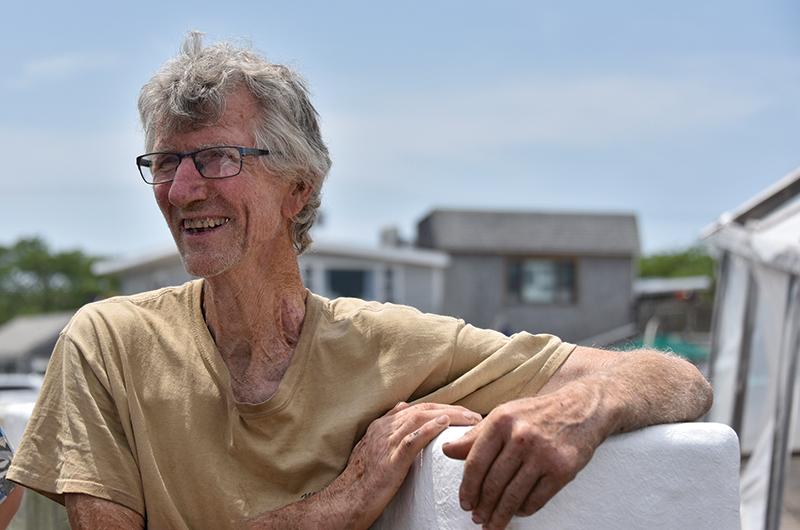
The work came easily and the pleasure of it erased time. He put a couple of pieces in a local gallery. And a fortuitous visit from a wealthy Edgartown resident led to a well-known Los Angeles furniture gallery: after sending photos, then shipping several pieces including a roll-top desk, he received a check that was beyond his wildest dreams. Box had found a new career, one that would not only keep him afloat creatively and financially but give him the freedom he craved.
That freedom staked his dream of building Seeker, which had been developing for more than forty years since he had found blueprints for a scow in the Smithsonian. Box would return to the sea of his childhood, the kingdom he so loved. He was in his late sixties.
Seven years after work began, Seeker launched in July 2018. The once clear plastic canopy that had protected her deck had frayed, and she looked more pirate ship than a greenhouse. She lacked an engine. Her 1,400-pound rudder had been set only three days before. But Box had to move: his space benefactor, Ralph Packer, was leasing the land to a wind turbine project and could no longer host Seeker, as he’d done for the last four years. Preparing for the launch meant four months of twelve-hour days.
The morning of an astronomical tide found Seeker elevated on a steel carriage that formed a rib cage to keep her steady. Two massive excavators inched Seeker sideways along steel beams slicked with Ivory soap, adding shims along the way, checking every detail as the tide slowly rose, until she met the water. Despite some Islanders who said she would never float, with a final pull from Packer’s tugboat she launched. Her first moment floating on water, Box called out from the deck, “It’s alive!” The crowd that had formed – friends, family, former workers, well-wishers, the just plain curious – cheered and several wept.
She took on water – as do all new boats – but drifted toward a steel pier, causing the onlookers a good deal of anxiety, many of whom scrambled over to help push her off. She continued to sink deeper into the water. Box and his crew had bilge pumps aboard but no hoses. Once the tug had towed Seeker to Tisbury Wharf, Box ran to Packer, who again came to the rescue, locating hoses and surrounding Seeker with sawdust, which lowered by buckets underneath the hull would find its way into the seams and provide temporary patches. Led by an unperturbed Box, everyone waited for the cypress planks to swell. In four hours she was relatively dry.
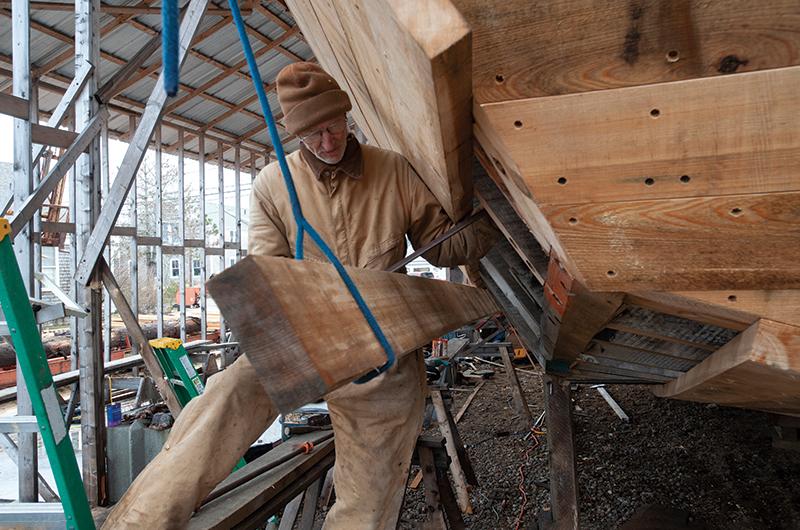
Soon Seeker moved from the Vineyard Haven wharf to what Box had hoped would be a short stay in Lake Tashmoo. He loved the feeling of her on water and with the addition of a propane stove, six solar panels to power a refrigerator/freezer, and bilge pumps, she would be his home while he worked on her spring through fall. He was developing his funding ideas; although he’d put close to $200,000 of his earnings into her and had donations from generous friends and family, he was still far from his goal. He had masts ready to go because he could finish them himself, but the sails would cost another $30,000 – plus rigging, plus the great expense of an engine. He had endured major setbacks: daunting insurance premiums, three moves of the twenty-two-ton boat, regulatory hassles with the town, the original masts being crushed by a snowplow, cancer that left him so exhausted that walking from the Eastville parking lot to the water for a swim seemed a Sysiphiean effort.
Then in January 2020, both Box and his son Jake were diagnosed with a viral heart infection so severe that Box required open-heart surgery. Once again, a frightening health crisis sidelined him. Once again, he experienced overwhelming exhaustion. When his doctor cleared him for a restart in April, he needed a week to accomplish one pushup; before surgery, his workouts included sixty pushups and one hundred deep squats. And always before him was the inspiration of his mother, working out on the trapeze until she was ninety.
In the past when I went aboard Seeker to talk, Box would pick me up from the Tashmoo dock in his rowboat. But when he fetched me for the last conversation we had in late October 2021, he wasn’t rowing but had an outboard motor and said he was grateful for it. He looked thinner, his neck more sinewy below the white beard he’d grown, his bushy brows shading his eyes. As before, I climbed Seeker’s ladder, feeling not the solidity of land but the swell of water as I grasped the rail and my foot found the first rung. Aboard the boat his mood was contemplative. He had told me that during the pandemic, funding possibilities retreated. His emails and letters went unanswered. We sat low to the deck, the hatch cover shielding us from a stiff breeze.
“I need to finish this boat or hand it over,” he says. “It’s not my idea of boating to be sitting on a mooring. I thought I could build this. I didn’t know where the money would come from and this coronavirus has put a hitch in my plan. I’ve got to have all the pieces and the pieces aren’t talking to each other. I’ve got masts, I’ve got the boat built, I’ve done what I can do. Raising the money and finding sponsorship to get the sails and the engine” – his voice breaks off.
He circles back to his youth in Seaford, where he knew everyone, and where he once fought the toughest kid in town and won by outmaneuvering him before calling off the fight. “If I’d beat him up he’d just be back. You have to be big enough to win a fight. If you don’t think you can win, you’ll lose. So when you take a job building a house or something like that, you’ve got to say, ‘Am I big enough to do that?’ And if you say ‘Yeah,’ then you’d better not be bullshitting. And I felt that I could do this. I felt I was big enough.
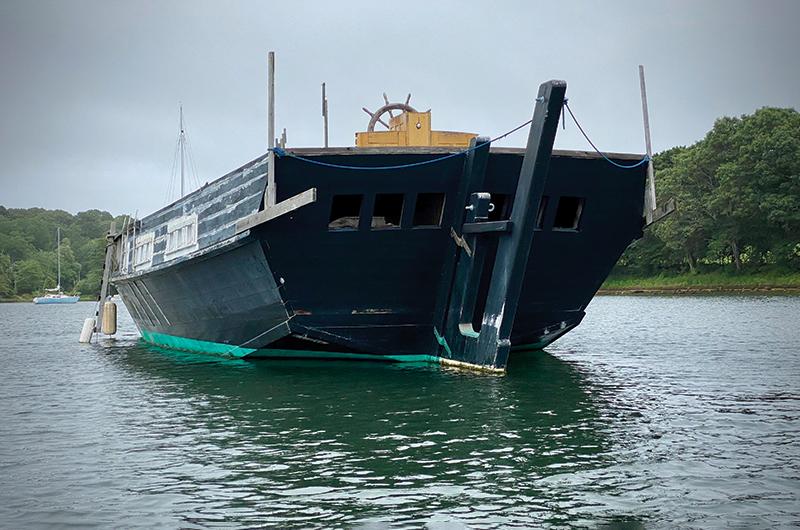
“So here we sit on this boat. And I’m at a real crossroads. Until I had my heart surgery, I was willing to put all my money and everything I have into the boat. I don’t have enough money to finish it, but I have enough to make it close. But then I’ll be sitting here broke, and I don’t feel comfortable doing that. So I’m going to get help finishing it, or I’m going to find it another home. It’s been a wonderful process and it’s a statement of who I am and what I love. I dreamed of making my driftwood furniture, sailing, doing all these things, but I’m not the man that I was in 2011 when I started this. I have other dreams I want to follow and pursue.”
His aspirations have not grown smaller, his goals have not diminished, but his fundraising capacity has. For the past few years the scow has been his home for all but the coldest months; down below he can read and think and work on the memoir he is writing about his Seaford days. Yet always he craves a larger life for the vessel. He champions Seeker as a community contribution that echoes the past but would be a useful and beautiful addition to the harbor if he could once again get help. But at this moment, with winter coming on, Box wishes he could just have a small boat, “something I could sail down to the islands. I’m in a different place now.”
During the long pause that follows, his interior winds shift. When he speaks again energy infuses his words, as though the ghosts of craftsmen and boatbuilders and volunteers and donors and believers have gathered aboard to urge him on. “But I also want to feel this boat under sail,” he says. “I want to see it through. There’s so much that could be done with it. And it’s not doing anything sitting here on the mooring. Who is going to finish it if I don’t?”

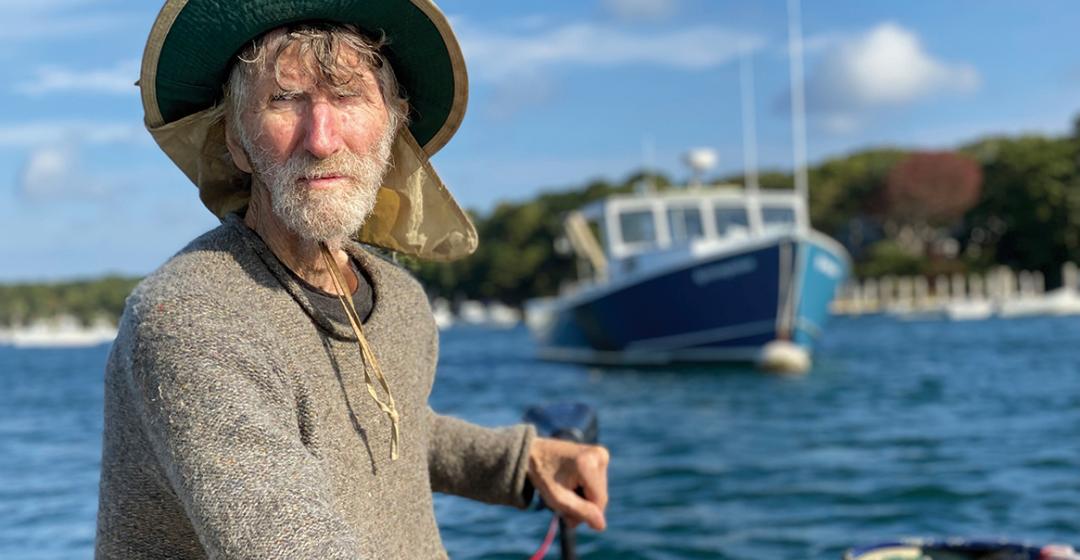


 6 comments
6 comments
Comments (6)